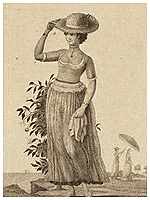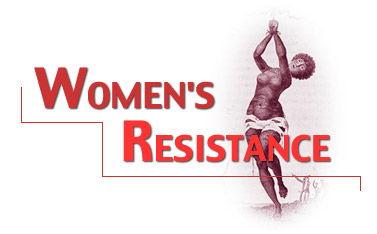Since the beginning of time woman has been the axis on which the world turns. Her ability to bring forth new life and her capacity to withstand mental and physical hardships make woman is who the world depends on to renovate and sustain itself. Her presence here on earth is indispensable.
 This is not about the general woman. This is about the black woman; specifically the black Caribbean Slave woman. Her presence has left a remarkable impact on history, one that most whites have refused to admit or even care to acknowledge. Few authors relay to the masses the trials and tribulations of black Caribbean Slave woman. White America refused to recognize that it was on the back of the black Caribbean Slave woman that the slave system was built. Within the configuration of the Caribbean slave system, her relationship with her "master" and her fellow slaves played a pivotal role This is not about the general woman. This is about the black woman; specifically the black Caribbean Slave woman. Her presence has left a remarkable impact on history, one that most whites have refused to admit or even care to acknowledge. Few authors relay to the masses the trials and tribulations of black Caribbean Slave woman. White America refused to recognize that it was on the back of the black Caribbean Slave woman that the slave system was built. Within the configuration of the Caribbean slave system, her relationship with her "master" and her fellow slaves played a pivotal role
One of the few extensive accounts discovered about the treatment of slaves in general is that of Thomas Thistlewood in Jamaica. His diary, which contains daily accounts of his activities and the activities of his slaves, sheds some light on the subject of the slave-owner’s relationship with the black Caribbean Slave woman. In Thistlewood’s entries, one discovers a fascination with some of his black slave women. His writings are emotionless and indifferent whether he is providing for an ailing slave or copulating with a slave woman. Yet despite this indifferent and unfeeling tone, one finds instances in Thistlewood’s entries that reveal the white world’s fascination with the black slave woman.
Thistlewood would on many occasions copulate with his black slave women and then pay them. He would also make a certain woman his "wife". A slave woman such as Nago Jenny would receive gifts while another slave woman would receive a whip to her backside. Thistlewood continuously had relations with various slave women multiple times throughout his stay in Jamaica. He relays these events in an odd Pig Latin. For example, we find he had a penchant for "taking" Black slave women out in the field. He says, "a.m. about eleven o’clock, Cum Ellin, an Ebo by the Morass side, Supp. Terr. Toward the little plantain walk." This diary entry states that about eleven o’clock in the morning he had sex with Ellin, an Ebo, on the ground by the plantain walk. It is doubtful that these "encounters" were voluntary on the part of the black slave woman, however, there are two black Caribbean slave women in particular who appear to have regular "encounters" with Thistlewood: Abba and Phibbah.
 Thistlewood seems to have affection for Abba. He slept with her a total of 155 times over a span of seven years and he paid her after every "encounter." For a time Thistlewood became jealous of Abba’s pursuit of an affair with Jimmy, a fellow slave. But of the two women, Phibbah is the most interesting because of the influence she appears to wield over Thistlewood. The two have a relationship that borders on that of husband and wife. Phibbah is able to cross the master/slave line without suffering the consequences. Slave women would occasionally resist the overtures of their masters and be punished severely for their behavior. Phibbah on the other hand was not subjected to such treatment from Thistlewood, who was after all her owner’s agent. She would blatantly shun him and was able to leave and return to the grounds at her discretion. Thistlewood seems to have affection for Abba. He slept with her a total of 155 times over a span of seven years and he paid her after every "encounter." For a time Thistlewood became jealous of Abba’s pursuit of an affair with Jimmy, a fellow slave. But of the two women, Phibbah is the most interesting because of the influence she appears to wield over Thistlewood. The two have a relationship that borders on that of husband and wife. Phibbah is able to cross the master/slave line without suffering the consequences. Slave women would occasionally resist the overtures of their masters and be punished severely for their behavior. Phibbah on the other hand was not subjected to such treatment from Thistlewood, who was after all her owner’s agent. She would blatantly shun him and was able to leave and return to the grounds at her discretion.
After he "took" her, she would get up and go sleep somewhere else. In one of his entries, he declared that "She was rather too saucy." One notices that he is concerned with Phibbah’s attitude toward him. He would constantly mention how Phibbah would deny him and would not speak to him. Phibbah would even argue with him when she suspected him of infidelity. However, in retaliation and in an effort to establish his dominance over her, he had sex with another slave woman in front of other slaves. Thistlewood wrote extensively of Phibbah in his diary. He seemed to pay attention to the most minute detail where she was concerned. He wrote of everything, from her toothache to her irregular monthly cycles to the treatment of her venereal disease. His relationship with her was in the open and he was rather affectionate towards her and their son Mulatto John. In his last will and testament Thistlewood provided for his "wife" Phibbah. He requested that a manumission be secured for Phibbah and her children. A lot of land was to be purchased and a house built for Phibbah the sum totaling 100 pounds.
 Most enslaved Caribbean women were not "kept," as Phibbah was. Thistlewood had another sex partner on a separate estate who was just a sexually independent as he was. She was known to sleep with several other slave men on the same estate. The male to female ratio was very contorted explaining the strong competition for companionship and the rampant violence. This was a stressful and difficult situation for the African man, who was used the being the "king" of his castle. In Jamaica the black Caribbean slave woman was able to go to whom she pleased and whenever she pleased. This placed on strain on the relationship between the slave man and the slave woman. The black woman, recognizing her value and the then current situation, took advantage. She would move from one man to another in quick succession. This caused an unharmonious situation among the slaves on the plantation. To add insult to injury, the slave woman was not always available to the slave man. The master could always come and claim what he rightfully "owned." This angered the slave man but what could he possibly do? The relationship between the three parties discussed was was the source of social discord between slave man and woman. The presence of the white slave owner further deteriorated an already severely weakened family structure. Most enslaved Caribbean women were not "kept," as Phibbah was. Thistlewood had another sex partner on a separate estate who was just a sexually independent as he was. She was known to sleep with several other slave men on the same estate. The male to female ratio was very contorted explaining the strong competition for companionship and the rampant violence. This was a stressful and difficult situation for the African man, who was used the being the "king" of his castle. In Jamaica the black Caribbean slave woman was able to go to whom she pleased and whenever she pleased. This placed on strain on the relationship between the slave man and the slave woman. The black woman, recognizing her value and the then current situation, took advantage. She would move from one man to another in quick succession. This caused an unharmonious situation among the slaves on the plantation. To add insult to injury, the slave woman was not always available to the slave man. The master could always come and claim what he rightfully "owned." This angered the slave man but what could he possibly do? The relationship between the three parties discussed was was the source of social discord between slave man and woman. The presence of the white slave owner further deteriorated an already severely weakened family structure.
|





